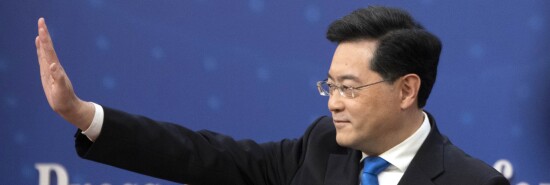
China uses Macron’s ‘strategic autonomy’ narrative to warn neighbors against US friendship
Tom Rogan
Video Embed
Addressing a Shanghai Cooperation Organization summit in India, Chinese Foreign Minister Qin Gang embraced the rhetoric of French President Emmanuel Macron.
“We should,” Qin told his fellow foreign ministers, “adhere to strategic autonomy and strengthen solidarity and mutual trust. We should firmly support each other in safeguarding sovereignty, security and development interests, and oppose external forces meddling in regional affairs and staging ‘color revolutions.'”
WHY HASN’T CANADA EXPELLED THE CHINESE AMBASSADOR?
Beijing’s great European friend, Hungarian Prime Minister Viktor Orban, has also been talking about “color revolutions” this week. Still, the more important point of note here is Qin’s centerpiece reference to “strategic autonomy.” This is the term that Macron uses to frame his foreign policy vision for France and the European Union. When he’s in Washington, Macron pretends that “strategic autonomy” means Europe taking a balanced approach between the U.S. and China and Europe’s building of a more robust defense capacity. When he’s in Beijing, as he was recently, Macron uses “strategic autonomy” for its truer purpose: to woo China into new trade and investment for France by dangling his separation from the U.S. on matters such as Taiwan.
The leader of America’s oldest ally, Macron knows that his “strategic autonomy” veil for appeasement of China carries outsize value to Beijing. Qin’s adoption of it, as here, proves as much. But China’s use of this narrative further underlines Macron’s obvious choice to place a preference on Chinese interests over those of the U.S. To be clear, Macron is not adopting actual strategic autonomy. He is adopting “strategic autonomy” as a cover for supporting Beijing on the most exigent matters.
This is no small concern. The U.S. military anticipates going to war with China over Taiwan before this decade is out. Washington is also attempting to prevent China from accessing the most valuable high-tech hardware and software for its military. Via “strategic autonomy,” however, France hasn’t just separated itself from those efforts. It has provided the political legitimacy for Beijing to pressure other nations to do the same.
Put another way, let’s hope that President of the European Commission Ursula von der Leyen, and not Macron, wins the struggle for the EU’s policy toward China.
